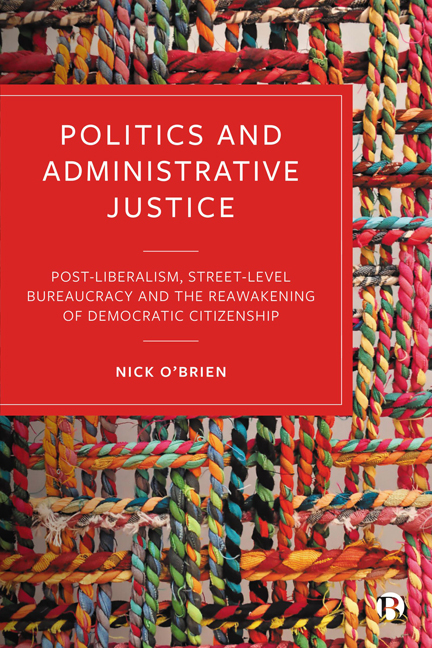 Politics and Administrative Justice
Politics and Administrative Justice Book contents
- Frontmatter
- Dedication
- Contents
- About the Author
- Acknowledgements
- 1 Introduction
- 2 Street-Level Bureaucracy and the Response to Citizen Grievance
- 3 The ‘Social Imaginary’ of Liberal Legalism
- 4 The Promise of Postliberalism
- 5 Citizen Grievance and the Spectre of Legalism
- 6 Postliberal Accountability: The Challenge of Disability Human Rights
- 7 Responding to Grievance: Mental Health and Special Educational Needs and Disability
- 8 Postliberal Administrative Justice
- 9 Conclusion
- References
- Index
8 - Postliberal Administrative Justice
Published online by Cambridge University Press: 27 March 2024
- Frontmatter
- Dedication
- Contents
- About the Author
- Acknowledgements
- 1 Introduction
- 2 Street-Level Bureaucracy and the Response to Citizen Grievance
- 3 The ‘Social Imaginary’ of Liberal Legalism
- 4 The Promise of Postliberalism
- 5 Citizen Grievance and the Spectre of Legalism
- 6 Postliberal Accountability: The Challenge of Disability Human Rights
- 7 Responding to Grievance: Mental Health and Special Educational Needs and Disability
- 8 Postliberal Administrative Justice
- 9 Conclusion
- References
- Index
Summary
Disability human rights invite transgression of the traditional legal approach to citizen grievance against public authorities. In the mental health and special educational needs and disability (SEND) systems, ombuds, tribunals and mediators have accepted that invitation while being constrained from doing so effectively by the residual constraints of legalism. The Weberian model of compliance still casts its shadow, obscuring the complexity of street-level bureaucracy, of socially embedded citizenship and of intelligent accountability.
An alternative that is responsive to social reality takes account of postliberal strategic emphases: on the positive enabling function of the state and the delicate moral equilibrium of the street-level bureaucrats who embody it; on society as a positive network of empowering association and identity; and on the individual citizen as endowed with dignity and political agency by formation in the complex networks of that civic association. Against that background, the function of those agencies charged with responding to citizen grievance becomes one of orchestrating the bridging relationships between citizen, society and state so that damaging social relationships are transformed into sources of mutual restoration.
The state and therapeutic justice
The limitations of ‘administrative justice’
The illustrative material afforded by the mental health system and SEND has indicated that the barriers preventing innovation are frequently ‘structural’, entailing political considerations about the allocation of public resources, and ‘systemic’ in that they concern the way in which public authorities are organized and run. As the ethnographic literature on street-level bureaucracy indicates, they are ‘cultural’ also, concerning the ethos and texture of institutional relationships, both internal and external. Such challenges are not confined to the mental health system or SEND but extend across much of the public administration fabric: recent studies, for example, of the ‘hostile environment’ in which immigration policy has been implemented by the Home Office, and the ‘cruel, inhuman and degrading’ application of benefits sanctions by the Department for Work and Pensions, reinforce the need for approaches that go beyond the ‘usual suspects’ of more mass complaintshandling and individual retrospective redress (Adler, 2018; Thomas, 2022).
- Type
- Chapter
- Information
- Politics and Administrative JusticePostliberalism, Street-Level Bureaucracy and the Reawakening of Democratic Citizenship, pp. 104 - 126Publisher: Bristol University PressPrint publication year: 2023


